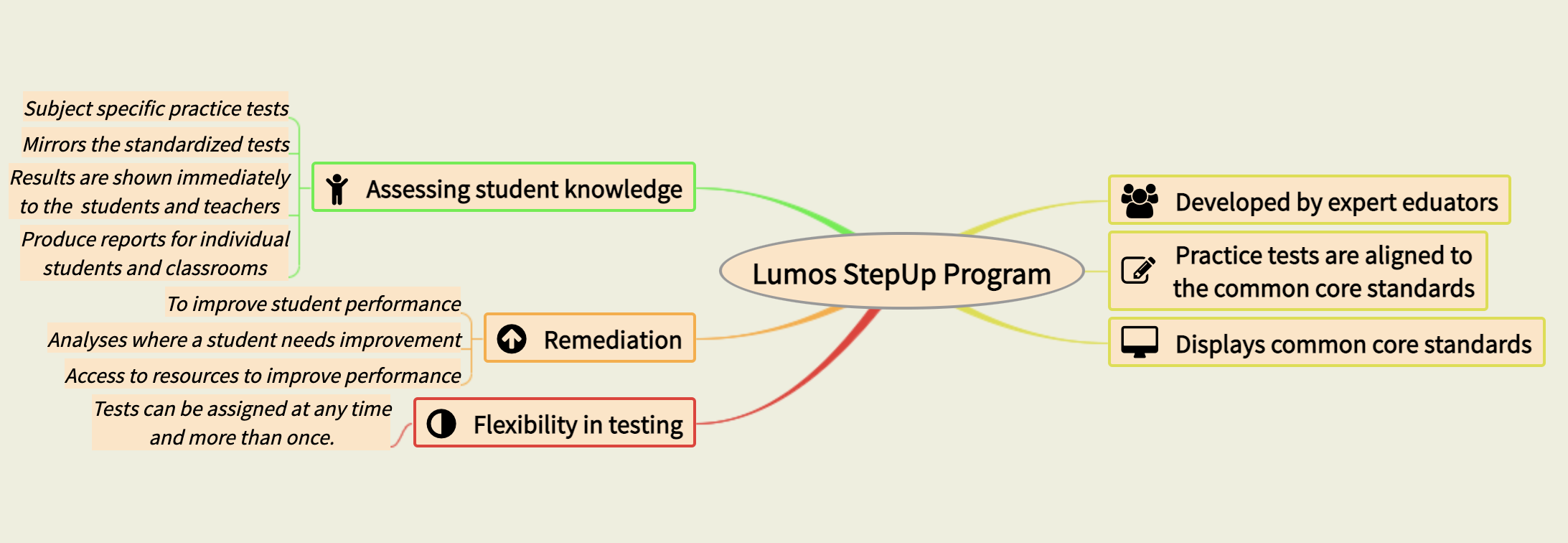
The level of success of any assessment program depends on the quality of the material offered to the student and the quality of the tools used for assessment. Lumos uses the programs developed by the education professionals within each school district and individual school as the basis for applying the assessment tools offered under the StepUp program. Besides, the Lumos StepUp program displays the Common Core standards upon which many state standardized test programs are based. The practice tests in StepUp are aligned to the Common Core standards so that students are being tested on the knowledge and skills required to meet the standards.
Here are measurements of assessment that Lumos considers essential and how the program incorporates the technologies of artificial intelligence and computer programming to support in providing assessment results to students, teachers, parents, and administrators.
1. Assessing student knowledge
The StepUp program provides subject-specific practice tests that mirror the standardized tests required by a state, whether that state uses a national standard such as PARCC or Smarter Balanced or a state-developed standard test.
Through programming, the test results are recorded and presented immediately to the student and the teacher. The number of correct and incorrect answers are displayed. For every wrong answer, the right answer, along with an explanation, is provided. For certain kinds of questions, the thought process the students followed to arrive at the solutions is displayed.
System-generated reports track student progress in the various areas assigned by a teacher and selected by a student, which include student performance on tests taken and remediation exercises performed. Reports can be produced for individual students and entire classrooms or grades, and data is tracked over time. The results are also available to administrators and parents.
2. Remediation
The remediation is a tool for improving student performance. While access to student performance on tests and exercises is essential, it is also important to provide resources to enhance student performance where necessary.
Using artificial intelligence, the StepUp program analyzes areas where a student’s performance needs to be improved, and displays resources available to the teacher and student that can be used to get more practice.
StepUp also offers each student the tools that the student can select to access resources to improve performance. For example, there are topic-specific workshops that a student or teacher can choose to provide additional practice and other resources such as articles and videos that a student can access through the StepUp database using the EdSearch tool.
3. Flexibility in Testing
While the full content of the practice tests in the StepUp program is useful for formative and summative testing, the availability of workbook topics provides a teacher with the capability of assigning more narrowly focused, topic-specific tests for students. These can be scheduled and given at any time, and more than once.

 The level of success of any assessment program depends on the quality of the material offered to the student and the quality of the tools used for assessment. Lumos uses the programs developed by the education professionals within each school district and individual school as the basis for applying the assessment tools offered under the StepUp program. Besides, the Lumos StepUp program displays the Common Core standards upon which many state standardized test programs are based. The practice tests in StepUp are aligned to the Common Core standards so that students are being tested on the knowledge and skills required to meet the standards.
Here are measurements of assessment that Lumos considers essential and how the program incorporates the technologies of artificial intelligence and computer programming to support in providing assessment results to students, teachers, parents, and administrators.
The level of success of any assessment program depends on the quality of the material offered to the student and the quality of the tools used for assessment. Lumos uses the programs developed by the education professionals within each school district and individual school as the basis for applying the assessment tools offered under the StepUp program. Besides, the Lumos StepUp program displays the Common Core standards upon which many state standardized test programs are based. The practice tests in StepUp are aligned to the Common Core standards so that students are being tested on the knowledge and skills required to meet the standards.
Here are measurements of assessment that Lumos considers essential and how the program incorporates the technologies of artificial intelligence and computer programming to support in providing assessment results to students, teachers, parents, and administrators.







